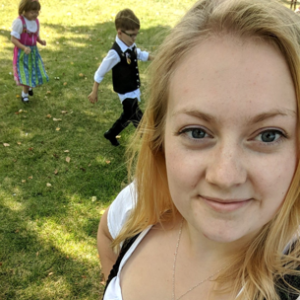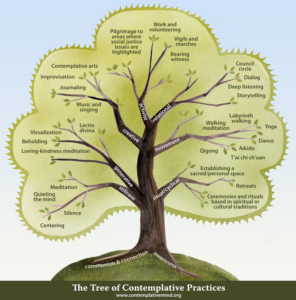A medical condition forced Samantha “Sammy” Selway to transition to online schooling. It was while she was in the process of doing this that she found Arizona State University’s sustainability degree.
“After I had decided to leave [another university] because of the Misophonia, the director of their Disability Resource Center told me about ASU’s online programs and then I found the sustainability major,” Selway said. “It was perfect and looking back, having to leave in-person college seems like a blessing in disguise.”
Selway is a senior at ASU pursuing an online Bachelor of Science in sustainability with a focus in energy, materials and technology. Continue reading to get acquainted with Selway, her propensity to power through the obstacles of life and her research project.
Question: Can you tell us a little bit about yourself?
Answer: I was born and raised in Minnesota by my lovely parents, Paul and Elspeth, who are originally from the U.K. They came here with my sister, Emily, in 1997 with the intention of staying short-term and returning home, but they decided to stay for the economic opportunity. They then bought a house on eight acres in the country, where I grew up and started to cultivate a love for the outdoors.
At age 12, I got Misophonia, a rare selective sound sensitivity syndrome that is characterized by intense aversion to oral sounds — chewing, eating and drinking — as well as repetitive background noises like pen tapping. Essentially, the nerve between my ear and brain miscategorizes sounds and then engages the fight-or-flight response. This is the reason for me leaving in-person school and switching to ASU Online. I am a huge advocate for sharing this information because we had no idea what it was for years and I hope that sharing it will help someone else in the future.
Another major obstacle I’ve been learning to overcome is chronic pain, specifically fibromyalgia, by being very diligent about getting enough sleep, managing stress in my life, and eating healthy. It was a big problem at the beginning of this project but through my research I have learned to bring love to the problem and give myself the space the heal.
Q: What was your “aha” moment when you realized you wanted to study sustainability?
A: I took an environmental studies course when I was studying at the University of Wisconscin-La Crosse and I thought, “Yes, this is how I am going to help people!” My professor was a sweet old man who was so passionate about what he was doing that it lit a spark inside of me. I already knew I wanted to help people, use my love for science, and not be in a lab all day but didn’t know how to connect them until I took that course.
Q: Why did you choose ASU School of Sustainability’s online program?
A: I started studying geography with an emphasis in environmental science and I knew it wasn’t the right fit, but at the time, it was the closest thing I could find at UW-La Crosse. After I had decided to leave because of the Misophonia, the director of their Disability Resource Center told me about ASU’s online programs and then I found the sustainability major. It was perfect and looking back, having to leave in-person college seems like a blessing in disguise.
Q: Can you tell us about your capstone research project?
A: For my capstone research project, I am writing a 20-page paper about interconnectedness as a way to contribute to a sustainable future. Interconnectedness is about feeling connected to ourselves, others, and the environment. The purpose of this topic is to turn inward and reflect in order to bring love and compassion to all of our relationships.
This improves communication and gives people the space to be authentic and have genuine conversations about sustainability without judgement, especially for those who may disagree or not know why sustainability is important. Interconnectedness and its related practices can do this by helping us to accept where we, and other people, are and then work toward solutions together from there. I am also writing a summary of my paper for the Solutions Journal and engaging my community in the conversation.
I chose this topic because I had recently taken SOS 322: International Development and Sustainability. This course really dives deep into your internal landscape and personal biases, which I really enjoy. Philosophy and neuroscience are very interesting to me. From there, I knew I needed a mentor to do a research project and immediately thought to contact my professor, Jason Papenfuss, and ask for recommendations. He recommended his mentor, Scott Cloutier, and from there, we decided on the topic together.
Q: What are your biggest learning outcomes from participating in this experience?
A: The biggest learning outcome for me was to take a deep breath and accept that things may unfold differently than what I imagined. Research is a fluid process that evolves over time and it is much more difficult to take those changes while having an expectation that it has to turn out another way. This is an excellent thing to learn and will continue to benefit me for the rest of my life.
Q: Do you have any general advice or “tips for success” for future sustainability students engaged in a research project?
A: Organization and communication! Get either a notebook or folder on your computer to write down ideas and a quick summary of each article you read. I found it incredibly helpful to take the quotes that were of interest to me in each article and put them in another place with the citation so that I could play with how I wanted to incorporate the information into my research paper. I also highly recommend being in consistent contact with your professor, especially if you have writer’s block or need some advice. That is why they are there.
Q: How do you envision applying sustainability to your future career?
A: I envision applying sustainability practices in any future work that I do, although I don’t have a specific job in mind yet. In essence, this degree is a real-world problem-solving degree and it can be applied to anything. I envision working for a passionate organization that at its core wants to help people and I am specifically interested in sustainable materials and design, renewable energy, and waste reduction.
Q: What does sustainability mean to you?
A: I found my favorite definition of sustainability while doing this research paper. It was written by Ulluwishewa (2018) and it says sustainability “is the ability of any individual community or country to meet their needs and live happily without compromising the ability of other individuals, communities, countries, and future generations to meet their needs and live happily” (p.66). It really brings a heart and human-centered approach to sustainability, which I find very important.
Ulluwishewa, R. (2018). Spirituality, Universal Love and Sustainable Behaviour. Annals of Behavioral Neuroscience, 1(1), 66-76. ISSN: 2638-9231.
Q: Is there anything you’d like to add?
A: Be kind to yourself and those around you!

